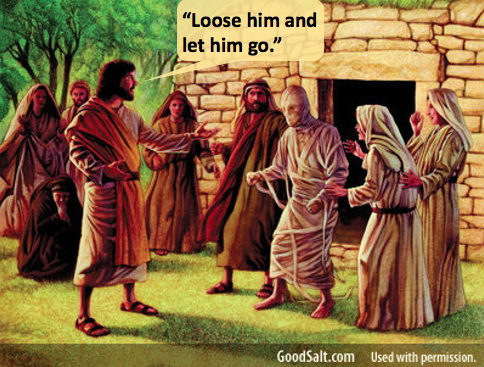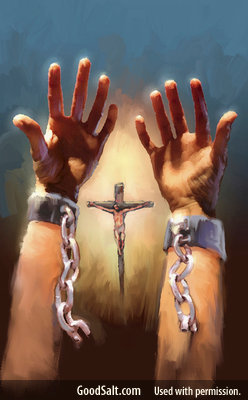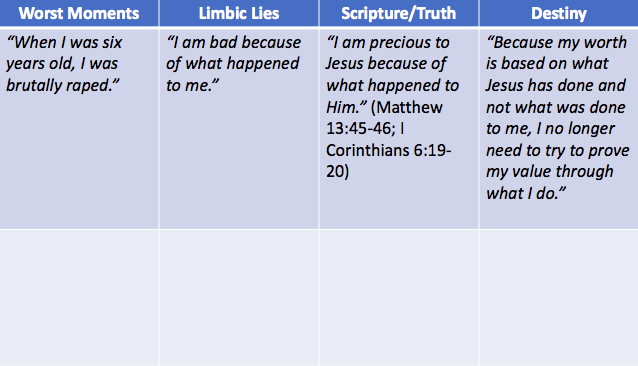“Jesus said to them, ‘Loose him, and let him go.’ ” John 11:44b
Today we will look at the final reason why the Lord may allow a situation to grow worse after we pray about it. It is to GET CHRISTIANS TO HELP ONE ANOTHER DISPOSE OF THEIR GRAVE CLOTHES (John 11:44b). Jesus had just commanded a dead man to come out of his grave (John 11:43). And a living Lazarus walked out of his tomb wrapped from head to toe in burial clothes. Only Jesus can bring life to dead churches, marriages, families, and individuals. That is Jesus’ job. But look at the end of verse 44: “Jesus said to them, ‘Loose him, and let him go.’ ” (John 11:44b). Could Jesus have caused the grave clothes of Lazarus to drop off? Absolutely! If He could raise Lazarus from the dead, He could certainly cause his grave clothes to drop off. But why didn’t He do this?
That would have left Lazarus naked and caused him a lot of humiliation and shame. By having those around him unwrap Lazarus, Jesus was providing an opportunity for people close to Lazarus to help him lose his grave clothes without losing his dignity. Likewise, Christians need to help one another get free from their spiritual and emotional grave clothes.
Jesus gives life to people. That is His job. But it is our job, the people of God, to help one another get out of the grave clothes that keep reborn people from acting alive. We may still have the grave clothes of shame and self-righteousness. We may view ourselves and God in a way that keeps us from experiencing His resurrection life. There may be deeply ingrained habits or thought patterns that prevent us from living resurrection lifestyles. Or we may have the grave clothes of unconfessed sin or an unforgiving spirit which keep us from experiencing true freedom in our Christian lives.
The church needs to be a safe place where we begin to peel away the grave clothes that keep born again people from experiencing the resurrection life of Jesus Christ. We cannot live victorious Christian lives in isolation from other believers. We need each other to experience the resurrection power of Christ in our lives.
How can churches become a safe place for believers to remove their grave clothes?
1. Ask others to help you remove your own grave clothes. Instead of jumping in like a spiritual superior to help remove the grave clothes of others, church leaders are to give others permission to help them remove what is keeping them from experiencing Christ’s resurrection power more fully. After all, how can church leaders expect others to be vulnerable about their struggles if they are not vulnerable about theirs? This kind of mutual vulnerability conveys the gospel message that we are all imperfect sinners in need of God’s grace (Romans 3:23; Ephesians 2:8-9). If Christians will live in humble vulnerability with one another, they will create an atmosphere that gives every believer in the church the safety and freedom to shed their grave clothes on the pathway to experiencing Christ’s resurrection power.
2. Extend the same grace to others as Christ has given to you (Ephesians 2:8-9; 4:32). None of us deserved salvation, but God freely gave it to us by grace through faith alone in Christ alone. We must create an atmosphere of this grace that invites imperfect sinners to come out of the darkness into the light of Jesus’ love. I have attended Christian churches and/or ministries where believers were treated harshly for having grave clothes that kept them from experiencing Christ’s resurrection power. They were belittled and bullied for having struggles, which only increased their fear and shame. They were viewed as an embarrassment to the church or ministry. According to them, since “true Christians” have no serious problems, no provisions were made to help them.
This is the exact opposite of what Jesus did with those who were broken and wounded. Christ fulfilled the Messianic prophecy in Isaiah 42:3 which says, “A bruised reed He will not break, and smoking flax He will not quench” (cf. Matthew 12:20). Jesus did not deal harshly with those who were already hurting nor did He extinguish what little hope a broken heart possessed. He came along side of them to strengthen them with His presence rather than step on them to advance His own plans. He wants to rekindle our love and passion for Him. Unlike the religious leaders of His day, Jesus had compassion for the weak and vulnerable. He extended gentleness and humility to the harassed and helpless (Matthew 9:36) as well as to the weary and burdened (Matthew 11:28). He gave forgiveness to the fallen (John 8:11). Likewise, the more churches have this Christlike mindset, the more they will expect “true Christians” to have obvious problems and provide ministries that provide the safety and security to promote transparency, healing, and growth.
3. Focus more on the heart instead of behavior. God is not uptight about our sin and shame. People are the ones who are uptight about our sin and shame. God still loved us even though we were undeserving, ungodly sinners without any strength to reconcile ourselves to Him. He did not wait for us to clean ourselves up before He loved us and died in our place. The Bible says, “For when we were still without strength, in due time Christ died for the ungodly” (Romans 5:6). “Christ died for the ungodly,” not the godly. “But God demonstrates His own love toward us, in that while we were still sinners, Christ died for us” (Romans 5:8). Christ died for us “while we were still sinners,” not saints. Christ looked beyond our sin to our hearts. He loved us no matter how often or badly we sinned.
Do our churches communicate this same kind of love to those the Lord brings to us? No matter how stinky a believer’s grave clothes are, do we love and accept that person as Jesus loves and accepts him or her? Do we take time to get to know the person, or do we stay preoccupied with their behavior and avoid them or judge them? It is Christ’s love that will embolden believers to remove their grave clothes and be transparent with one another, not focusing on behavior. After all, God’s “perfect love casts out fear” (I John 4:18). And fear and shame are two of the most common obstacles that keep people from being vulnerable with one another. But when we experience God’s incredible love for us through other believers who love and care for us no matter what we have done, we will respond with love toward our Lord and toward His children (I John 4:19).
4. Define believers by what God says about them, not by what they do. Christians are not defined by their grave clothes. They are defined by what God says about them. For example, the apostle Paul wrote the book of Ephesians to Christians who were living in the city of Ephesus, a sex-saturated society that was the home of the temple Diana. Christians were enticed by temple teachings to live without restraint. Paul countered this godless culture by emphasizing the Christian’s new identity in chapters 1-3, followed by a call to live in a way that is consistent with who they are in chapters 4-6.
An example of this is seen in Ephesians 5:8-10. Paul writes, “8For you were once darkness, but now you are light in the Lord. Walk as children of light 9 (for the fruit of the Spirit is in all goodness, righteousness, and truth), 10 finding out what is acceptable to the Lord.” Notice that Paul starts with who they now are in Christ – “you are light in the Lord” (5:8a). The light of Jesus Christ now defined who they are, not the darkness of their sin. Paul then concludes, “walk as children of light” (5:8b). Jesus is the “light of the world” (John 8:12) and His followers are defined by His light.
Christian speaker and author, Dr. Tony Evans, writes, “His followers must reflect Him the way the moon reflects the sun—not as crescent-moon Christians but as full-moon Christians. And we can’t reflect His light unless we’re in the light. So, if you want to reflect Christ, you have to be absorbing Christ through cultivating an intimate walk and relationship with Him (see John 15:1-16).” (Dr. Tony Evans, The Tony Evans Bible Commentary, B&H Publishing Group. Kindle Edition. pg. 2110).
As we grow closer to Jesus and learn how He sees us, we will begin to live like children of light who produce “goodness, righteousness, and truth” as we discover what is “acceptable to the Lord” (5:9-10).
If we want to see believers shed their grave clothes and experience the resurrection power of Jesus more fully, we must focus on what God says about them instead of on what they have done. Why? Because the more they see themselves as God sees them, the more He will transform their lives. After all, we act in the way we perceive ourselves to be. The Bible says, “For as he thinks in his heart, so is he.” (Proverbs 23:7). Our behavior does not determine who we are. At the very core of our being we are God’s children and God wants us to learn to start acting in a way that is consistent with who you are.
For example, if you see yourself as an addict at the core of your being, what will be the most natural thing for you to do? To stay sober or practice your addiction? Practice your addiction. What will be the most unnatural thing for you to do? Stay sober. But if you see yourself as a child of God at the core of your being (John 1:12; I John 3:1-2), what is the most natural thing for you to do? Stay sober. Satan wants to convince you that you are a sinner. Why? Because sinning is accepted as natural. But if you realize and believe you are a child of God at the core of your being, then you will come to the conclusion that sinning compromises who you are. Sin is inconsistent with who you are in Christ. The more a believer sees themselves as God sees them, the more they will realize their grave clothes no longer define who they are. In fact, wearing their grave clothes will seem unnatural and restrictive to them.
Prayer: Wow, Lord Jesus! Many times I have read the raising of Lazarus from the dead, but I had not noticed the last part of verse 44. What a powerful application this is for the church today. Yes, You gave life to Lazarus as only You can do. But You want Your people to help him remove his grave clothes so he can experience his new life more fully. Oh Lord, please awaken Your church to see their role in helping other believers remove their grave clothes in a way that preserves their dignity and enables them to more fully experience Your resurrection power in their lives. In Your life-giving name I pray. Amen.







